Nursing Assignment: Applying Transtheoretical Model for Harry's Case
VerifiedAdded on 2022/11/07
|8
|2313
|93
Report
AI Summary
This nursing assignment explores the application of the Transtheoretical Model of behavior change in a clinical setting, specifically focusing on a case study involving a patient named Harry. The assignment details the six stages of the model: pre-contemplation, contemplation, preparation, action, maintenance, and termination, and how motivational interviewing can be used to facilitate progress through these stages. The paper discusses the psychological aspects of change, the importance of empathy and non-judgmental engagement, and the use of specific techniques such as elicit self-motivation statements and reflection to encourage patients to adopt healthier behaviors. The assignment emphasizes the importance of adapting interventions to the patient's current stage of change and highlights the benefits of motivational interviewing in promoting long-term behavior modification and improved patient outcomes. The conclusion stresses the integration of practical, cognitive, and evaluative processes to enhance social appraisal, boost relationships, and promote healthy behaviors.
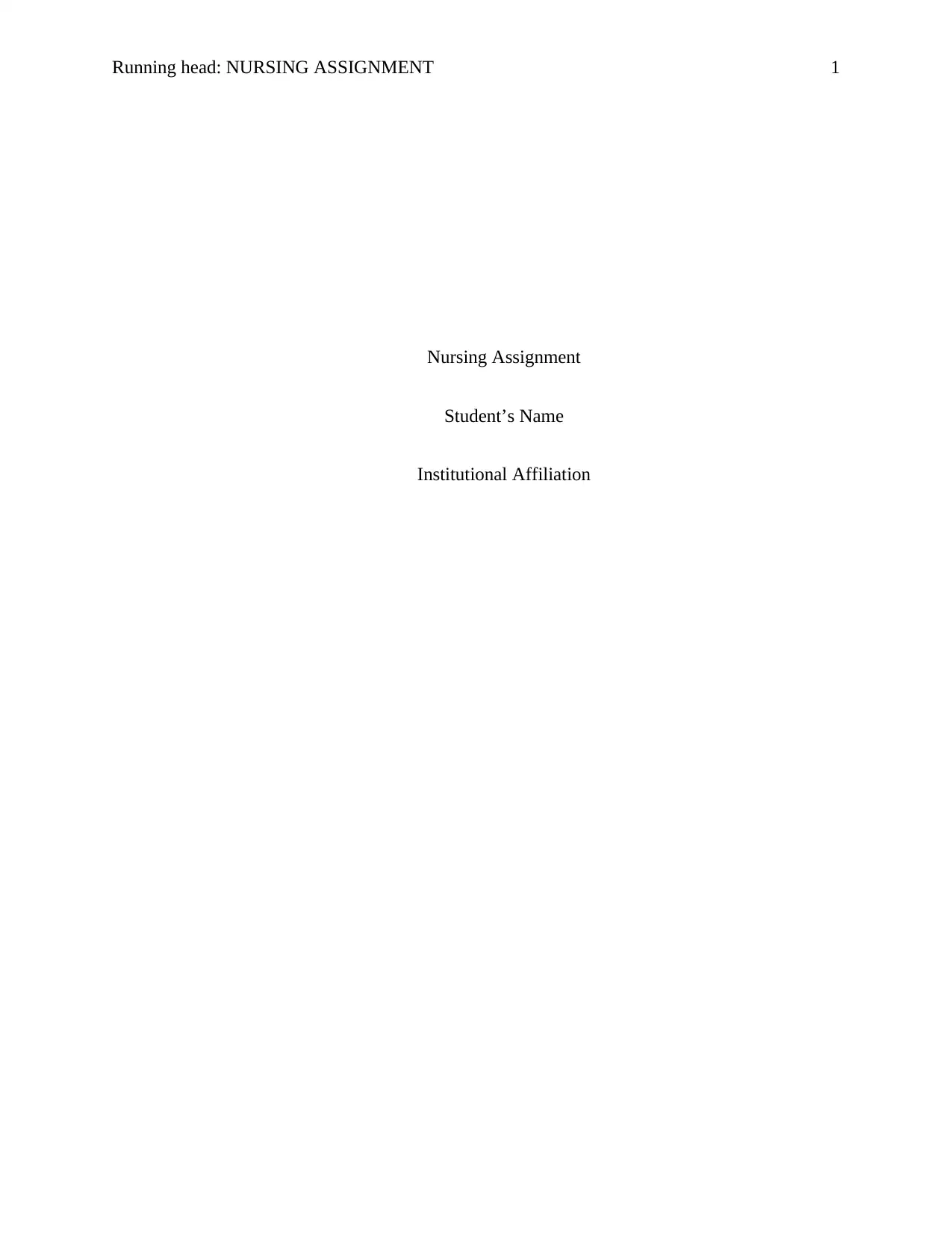
Running head: NURSING ASSIGNMENT 1
Nursing Assignment
Student’s Name
Institutional Affiliation
Nursing Assignment
Student’s Name
Institutional Affiliation
Paraphrase This Document
Need a fresh take? Get an instant paraphrase of this document with our AI Paraphraser
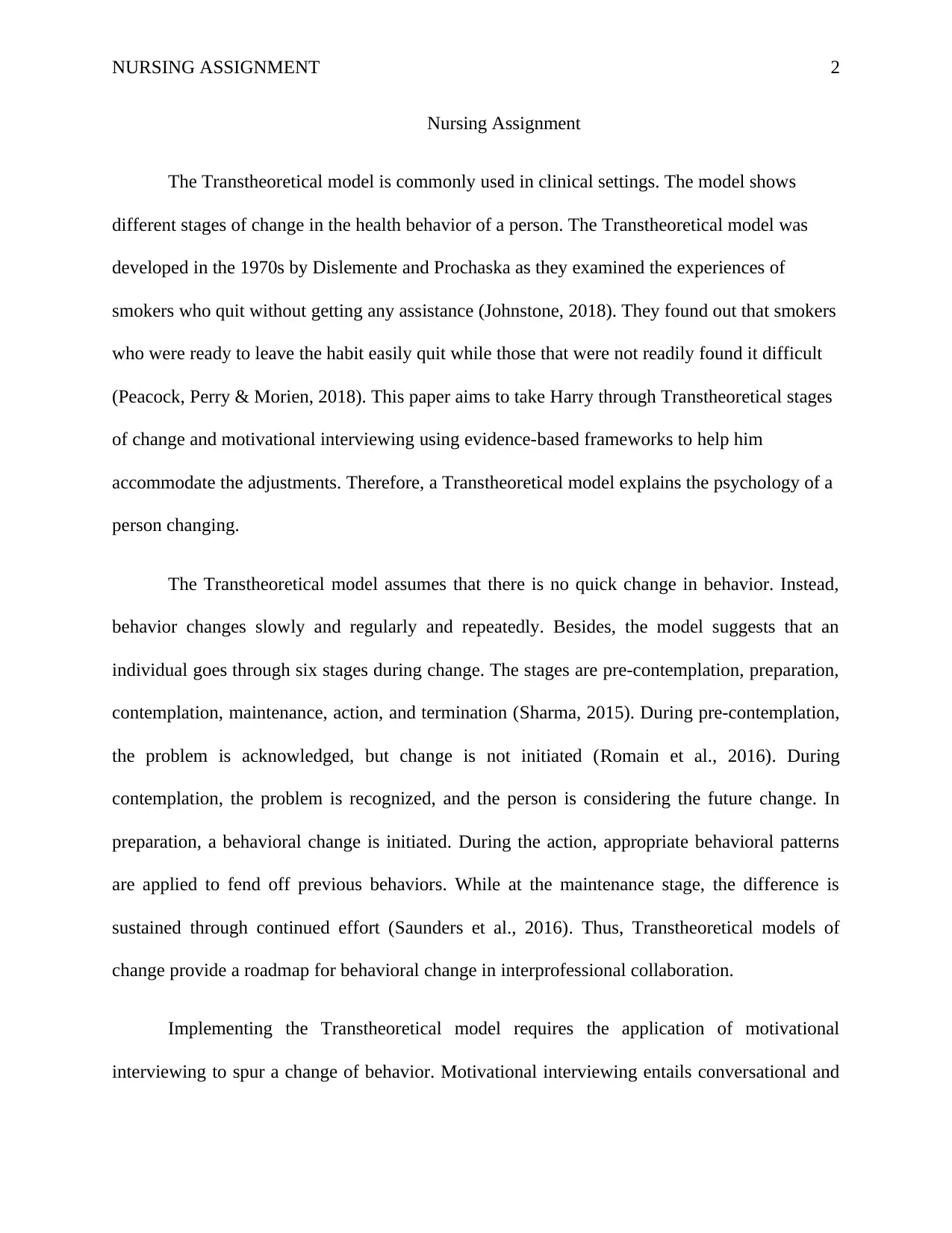
NURSING ASSIGNMENT 2
Nursing Assignment
The Transtheoretical model is commonly used in clinical settings. The model shows
different stages of change in the health behavior of a person. The Transtheoretical model was
developed in the 1970s by Dislemente and Prochaska as they examined the experiences of
smokers who quit without getting any assistance (Johnstone, 2018). They found out that smokers
who were ready to leave the habit easily quit while those that were not readily found it difficult
(Peacock, Perry & Morien, 2018). This paper aims to take Harry through Transtheoretical stages
of change and motivational interviewing using evidence-based frameworks to help him
accommodate the adjustments. Therefore, a Transtheoretical model explains the psychology of a
person changing.
The Transtheoretical model assumes that there is no quick change in behavior. Instead,
behavior changes slowly and regularly and repeatedly. Besides, the model suggests that an
individual goes through six stages during change. The stages are pre-contemplation, preparation,
contemplation, maintenance, action, and termination (Sharma, 2015). During pre-contemplation,
the problem is acknowledged, but change is not initiated (Romain et al., 2016). During
contemplation, the problem is recognized, and the person is considering the future change. In
preparation, a behavioral change is initiated. During the action, appropriate behavioral patterns
are applied to fend off previous behaviors. While at the maintenance stage, the difference is
sustained through continued effort (Saunders et al., 2016). Thus, Transtheoretical models of
change provide a roadmap for behavioral change in interprofessional collaboration.
Implementing the Transtheoretical model requires the application of motivational
interviewing to spur a change of behavior. Motivational interviewing entails conversational and
Nursing Assignment
The Transtheoretical model is commonly used in clinical settings. The model shows
different stages of change in the health behavior of a person. The Transtheoretical model was
developed in the 1970s by Dislemente and Prochaska as they examined the experiences of
smokers who quit without getting any assistance (Johnstone, 2018). They found out that smokers
who were ready to leave the habit easily quit while those that were not readily found it difficult
(Peacock, Perry & Morien, 2018). This paper aims to take Harry through Transtheoretical stages
of change and motivational interviewing using evidence-based frameworks to help him
accommodate the adjustments. Therefore, a Transtheoretical model explains the psychology of a
person changing.
The Transtheoretical model assumes that there is no quick change in behavior. Instead,
behavior changes slowly and regularly and repeatedly. Besides, the model suggests that an
individual goes through six stages during change. The stages are pre-contemplation, preparation,
contemplation, maintenance, action, and termination (Sharma, 2015). During pre-contemplation,
the problem is acknowledged, but change is not initiated (Romain et al., 2016). During
contemplation, the problem is recognized, and the person is considering the future change. In
preparation, a behavioral change is initiated. During the action, appropriate behavioral patterns
are applied to fend off previous behaviors. While at the maintenance stage, the difference is
sustained through continued effort (Saunders et al., 2016). Thus, Transtheoretical models of
change provide a roadmap for behavioral change in interprofessional collaboration.
Implementing the Transtheoretical model requires the application of motivational
interviewing to spur a change of behavior. Motivational interviewing entails conversational and
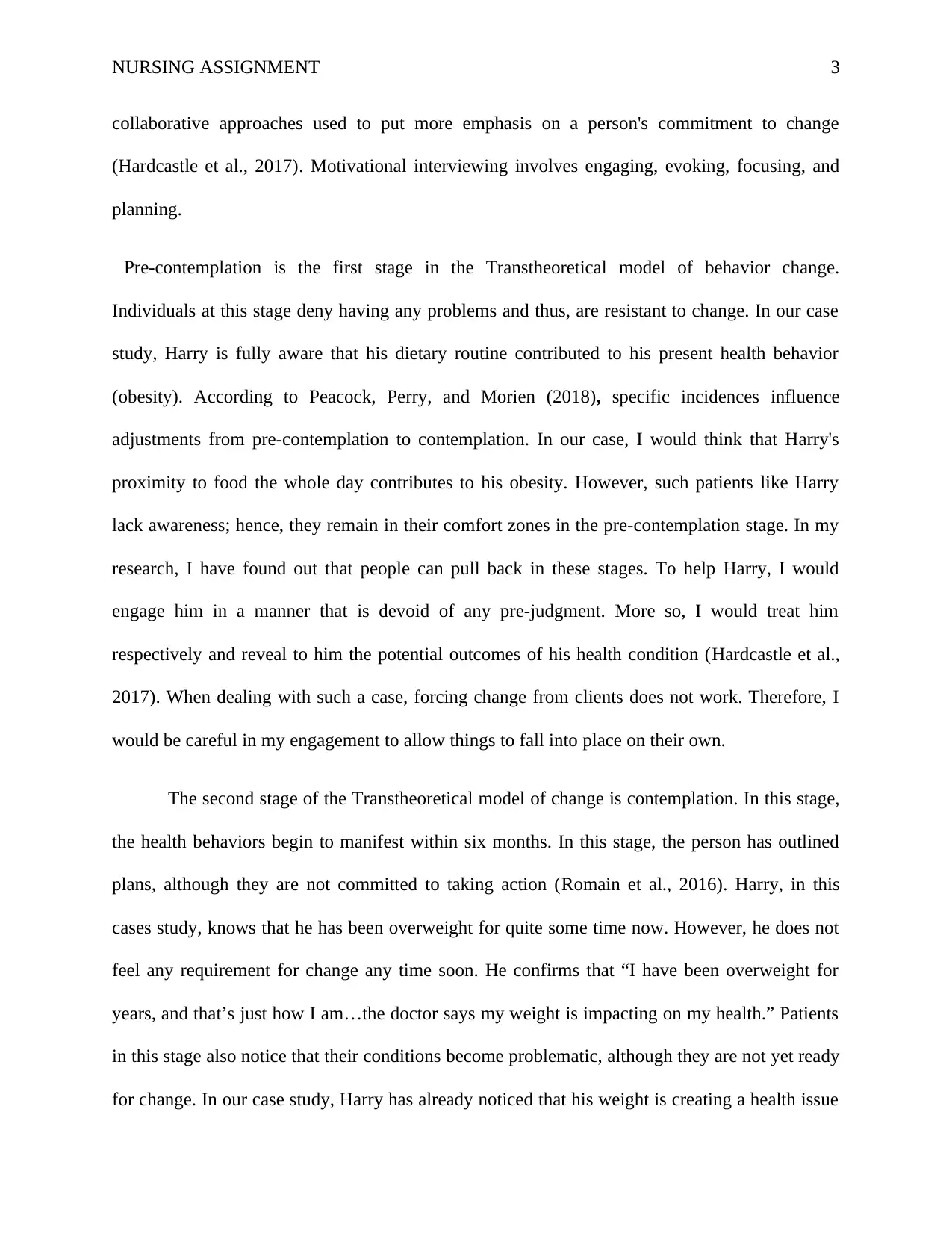
NURSING ASSIGNMENT 3
collaborative approaches used to put more emphasis on a person's commitment to change
(Hardcastle et al., 2017). Motivational interviewing involves engaging, evoking, focusing, and
planning.
Pre-contemplation is the first stage in the Transtheoretical model of behavior change.
Individuals at this stage deny having any problems and thus, are resistant to change. In our case
study, Harry is fully aware that his dietary routine contributed to his present health behavior
(obesity). According to Peacock, Perry, and Morien (2018), specific incidences influence
adjustments from pre-contemplation to contemplation. In our case, I would think that Harry's
proximity to food the whole day contributes to his obesity. However, such patients like Harry
lack awareness; hence, they remain in their comfort zones in the pre-contemplation stage. In my
research, I have found out that people can pull back in these stages. To help Harry, I would
engage him in a manner that is devoid of any pre-judgment. More so, I would treat him
respectively and reveal to him the potential outcomes of his health condition (Hardcastle et al.,
2017). When dealing with such a case, forcing change from clients does not work. Therefore, I
would be careful in my engagement to allow things to fall into place on their own.
The second stage of the Transtheoretical model of change is contemplation. In this stage,
the health behaviors begin to manifest within six months. In this stage, the person has outlined
plans, although they are not committed to taking action (Romain et al., 2016). Harry, in this
cases study, knows that he has been overweight for quite some time now. However, he does not
feel any requirement for change any time soon. He confirms that “I have been overweight for
years, and that’s just how I am…the doctor says my weight is impacting on my health.” Patients
in this stage also notice that their conditions become problematic, although they are not yet ready
for change. In our case study, Harry has already noticed that his weight is creating a health issue
collaborative approaches used to put more emphasis on a person's commitment to change
(Hardcastle et al., 2017). Motivational interviewing involves engaging, evoking, focusing, and
planning.
Pre-contemplation is the first stage in the Transtheoretical model of behavior change.
Individuals at this stage deny having any problems and thus, are resistant to change. In our case
study, Harry is fully aware that his dietary routine contributed to his present health behavior
(obesity). According to Peacock, Perry, and Morien (2018), specific incidences influence
adjustments from pre-contemplation to contemplation. In our case, I would think that Harry's
proximity to food the whole day contributes to his obesity. However, such patients like Harry
lack awareness; hence, they remain in their comfort zones in the pre-contemplation stage. In my
research, I have found out that people can pull back in these stages. To help Harry, I would
engage him in a manner that is devoid of any pre-judgment. More so, I would treat him
respectively and reveal to him the potential outcomes of his health condition (Hardcastle et al.,
2017). When dealing with such a case, forcing change from clients does not work. Therefore, I
would be careful in my engagement to allow things to fall into place on their own.
The second stage of the Transtheoretical model of change is contemplation. In this stage,
the health behaviors begin to manifest within six months. In this stage, the person has outlined
plans, although they are not committed to taking action (Romain et al., 2016). Harry, in this
cases study, knows that he has been overweight for quite some time now. However, he does not
feel any requirement for change any time soon. He confirms that “I have been overweight for
years, and that’s just how I am…the doctor says my weight is impacting on my health.” Patients
in this stage also notice that their conditions become problematic, although they are not yet ready
for change. In our case study, Harry has already noticed that his weight is creating a health issue
⊘ This is a preview!⊘
Do you want full access?
Subscribe today to unlock all pages.

Trusted by 1+ million students worldwide
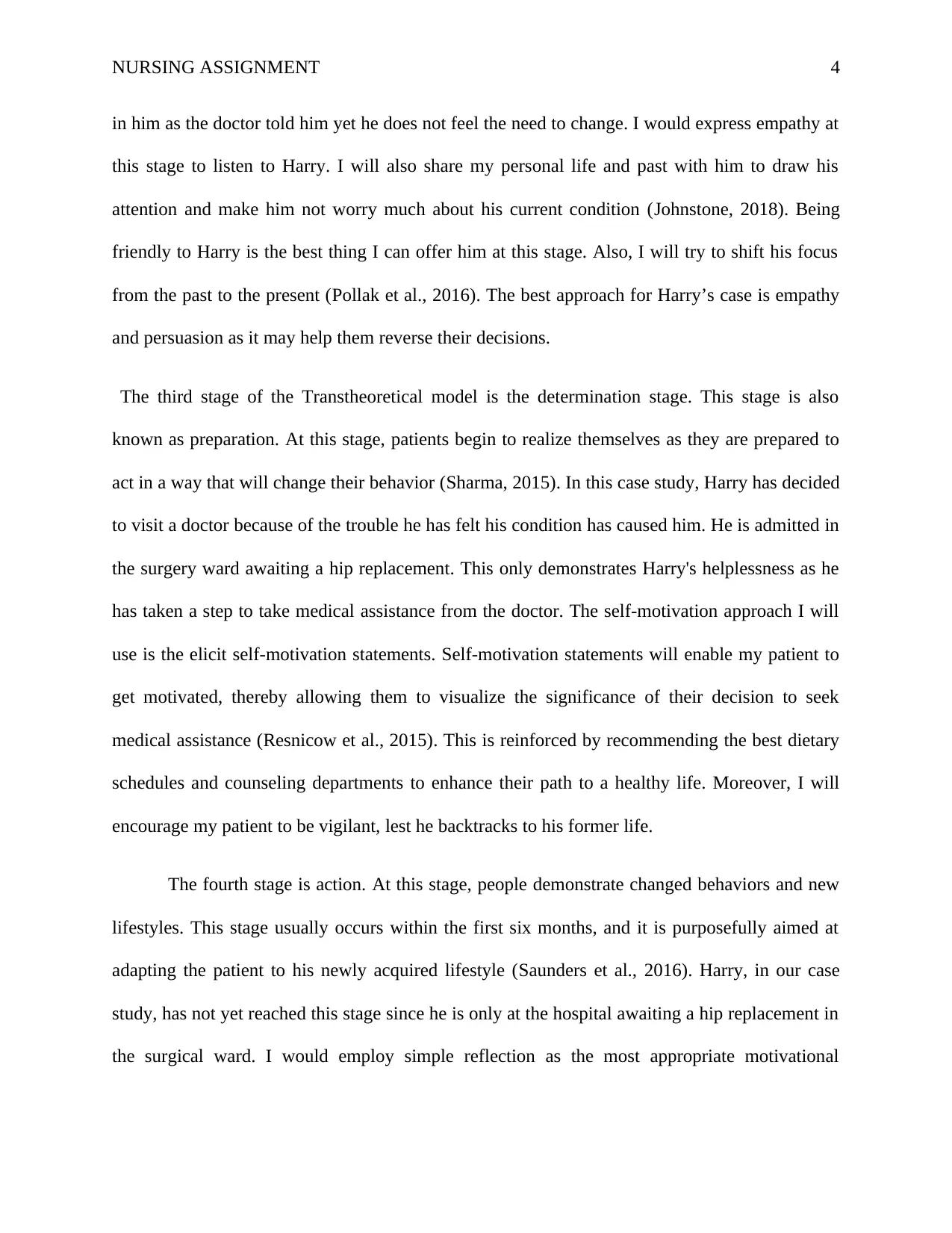
NURSING ASSIGNMENT 4
in him as the doctor told him yet he does not feel the need to change. I would express empathy at
this stage to listen to Harry. I will also share my personal life and past with him to draw his
attention and make him not worry much about his current condition (Johnstone, 2018). Being
friendly to Harry is the best thing I can offer him at this stage. Also, I will try to shift his focus
from the past to the present (Pollak et al., 2016). The best approach for Harry’s case is empathy
and persuasion as it may help them reverse their decisions.
The third stage of the Transtheoretical model is the determination stage. This stage is also
known as preparation. At this stage, patients begin to realize themselves as they are prepared to
act in a way that will change their behavior (Sharma, 2015). In this case study, Harry has decided
to visit a doctor because of the trouble he has felt his condition has caused him. He is admitted in
the surgery ward awaiting a hip replacement. This only demonstrates Harry's helplessness as he
has taken a step to take medical assistance from the doctor. The self-motivation approach I will
use is the elicit self-motivation statements. Self-motivation statements will enable my patient to
get motivated, thereby allowing them to visualize the significance of their decision to seek
medical assistance (Resnicow et al., 2015). This is reinforced by recommending the best dietary
schedules and counseling departments to enhance their path to a healthy life. Moreover, I will
encourage my patient to be vigilant, lest he backtracks to his former life.
The fourth stage is action. At this stage, people demonstrate changed behaviors and new
lifestyles. This stage usually occurs within the first six months, and it is purposefully aimed at
adapting the patient to his newly acquired lifestyle (Saunders et al., 2016). Harry, in our case
study, has not yet reached this stage since he is only at the hospital awaiting a hip replacement in
the surgical ward. I would employ simple reflection as the most appropriate motivational
in him as the doctor told him yet he does not feel the need to change. I would express empathy at
this stage to listen to Harry. I will also share my personal life and past with him to draw his
attention and make him not worry much about his current condition (Johnstone, 2018). Being
friendly to Harry is the best thing I can offer him at this stage. Also, I will try to shift his focus
from the past to the present (Pollak et al., 2016). The best approach for Harry’s case is empathy
and persuasion as it may help them reverse their decisions.
The third stage of the Transtheoretical model is the determination stage. This stage is also
known as preparation. At this stage, patients begin to realize themselves as they are prepared to
act in a way that will change their behavior (Sharma, 2015). In this case study, Harry has decided
to visit a doctor because of the trouble he has felt his condition has caused him. He is admitted in
the surgery ward awaiting a hip replacement. This only demonstrates Harry's helplessness as he
has taken a step to take medical assistance from the doctor. The self-motivation approach I will
use is the elicit self-motivation statements. Self-motivation statements will enable my patient to
get motivated, thereby allowing them to visualize the significance of their decision to seek
medical assistance (Resnicow et al., 2015). This is reinforced by recommending the best dietary
schedules and counseling departments to enhance their path to a healthy life. Moreover, I will
encourage my patient to be vigilant, lest he backtracks to his former life.
The fourth stage is action. At this stage, people demonstrate changed behaviors and new
lifestyles. This stage usually occurs within the first six months, and it is purposefully aimed at
adapting the patient to his newly acquired lifestyle (Saunders et al., 2016). Harry, in our case
study, has not yet reached this stage since he is only at the hospital awaiting a hip replacement in
the surgical ward. I would employ simple reflection as the most appropriate motivational
Paraphrase This Document
Need a fresh take? Get an instant paraphrase of this document with our AI Paraphraser
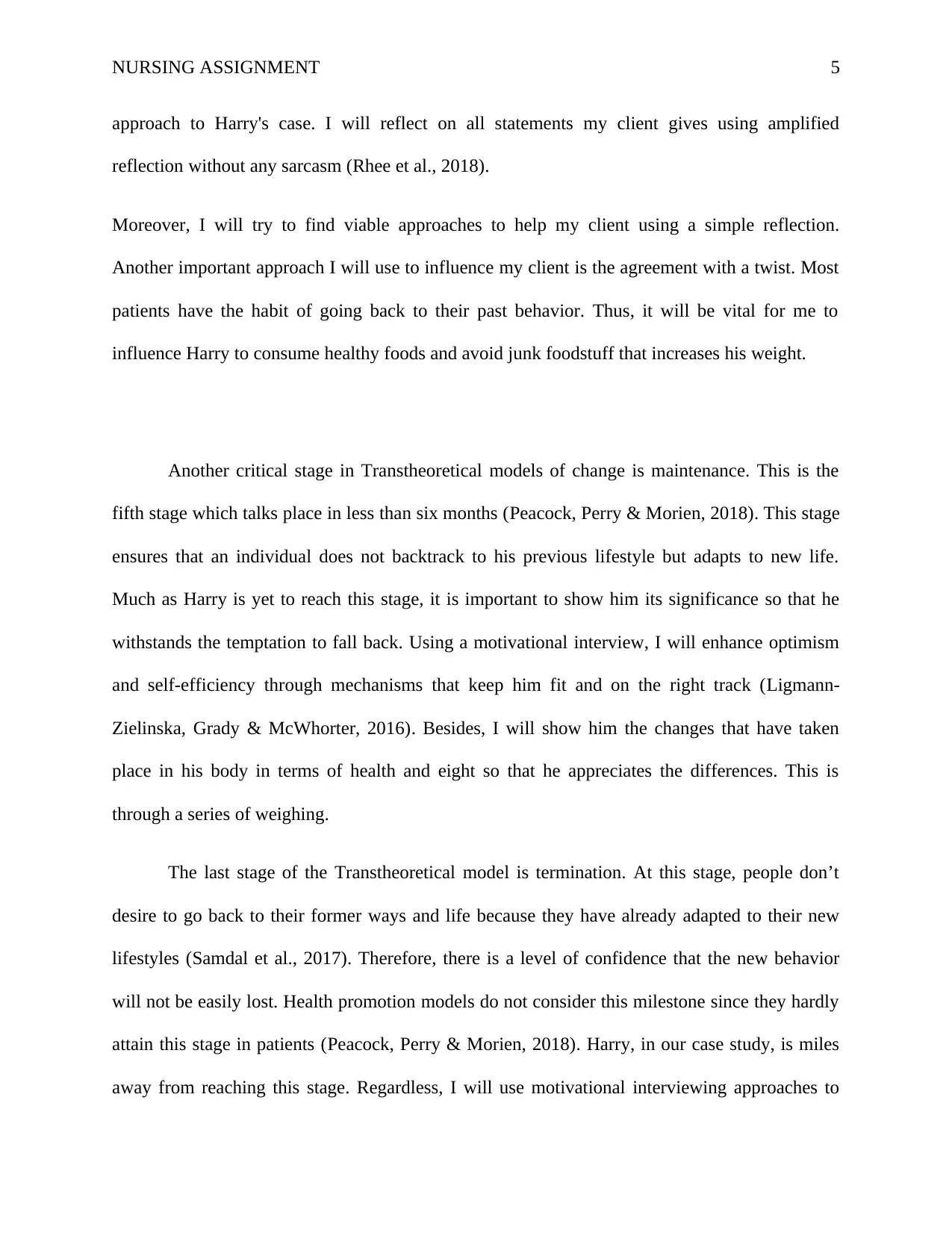
NURSING ASSIGNMENT 5
approach to Harry's case. I will reflect on all statements my client gives using amplified
reflection without any sarcasm (Rhee et al., 2018).
Moreover, I will try to find viable approaches to help my client using a simple reflection.
Another important approach I will use to influence my client is the agreement with a twist. Most
patients have the habit of going back to their past behavior. Thus, it will be vital for me to
influence Harry to consume healthy foods and avoid junk foodstuff that increases his weight.
Another critical stage in Transtheoretical models of change is maintenance. This is the
fifth stage which talks place in less than six months (Peacock, Perry & Morien, 2018). This stage
ensures that an individual does not backtrack to his previous lifestyle but adapts to new life.
Much as Harry is yet to reach this stage, it is important to show him its significance so that he
withstands the temptation to fall back. Using a motivational interview, I will enhance optimism
and self-efficiency through mechanisms that keep him fit and on the right track (Ligmann-
Zielinska, Grady & McWhorter, 2016). Besides, I will show him the changes that have taken
place in his body in terms of health and eight so that he appreciates the differences. This is
through a series of weighing.
The last stage of the Transtheoretical model is termination. At this stage, people don’t
desire to go back to their former ways and life because they have already adapted to their new
lifestyles (Samdal et al., 2017). Therefore, there is a level of confidence that the new behavior
will not be easily lost. Health promotion models do not consider this milestone since they hardly
attain this stage in patients (Peacock, Perry & Morien, 2018). Harry, in our case study, is miles
away from reaching this stage. Regardless, I will use motivational interviewing approaches to
approach to Harry's case. I will reflect on all statements my client gives using amplified
reflection without any sarcasm (Rhee et al., 2018).
Moreover, I will try to find viable approaches to help my client using a simple reflection.
Another important approach I will use to influence my client is the agreement with a twist. Most
patients have the habit of going back to their past behavior. Thus, it will be vital for me to
influence Harry to consume healthy foods and avoid junk foodstuff that increases his weight.
Another critical stage in Transtheoretical models of change is maintenance. This is the
fifth stage which talks place in less than six months (Peacock, Perry & Morien, 2018). This stage
ensures that an individual does not backtrack to his previous lifestyle but adapts to new life.
Much as Harry is yet to reach this stage, it is important to show him its significance so that he
withstands the temptation to fall back. Using a motivational interview, I will enhance optimism
and self-efficiency through mechanisms that keep him fit and on the right track (Ligmann-
Zielinska, Grady & McWhorter, 2016). Besides, I will show him the changes that have taken
place in his body in terms of health and eight so that he appreciates the differences. This is
through a series of weighing.
The last stage of the Transtheoretical model is termination. At this stage, people don’t
desire to go back to their former ways and life because they have already adapted to their new
lifestyles (Samdal et al., 2017). Therefore, there is a level of confidence that the new behavior
will not be easily lost. Health promotion models do not consider this milestone since they hardly
attain this stage in patients (Peacock, Perry & Morien, 2018). Harry, in our case study, is miles
away from reaching this stage. Regardless, I will use motivational interviewing approaches to
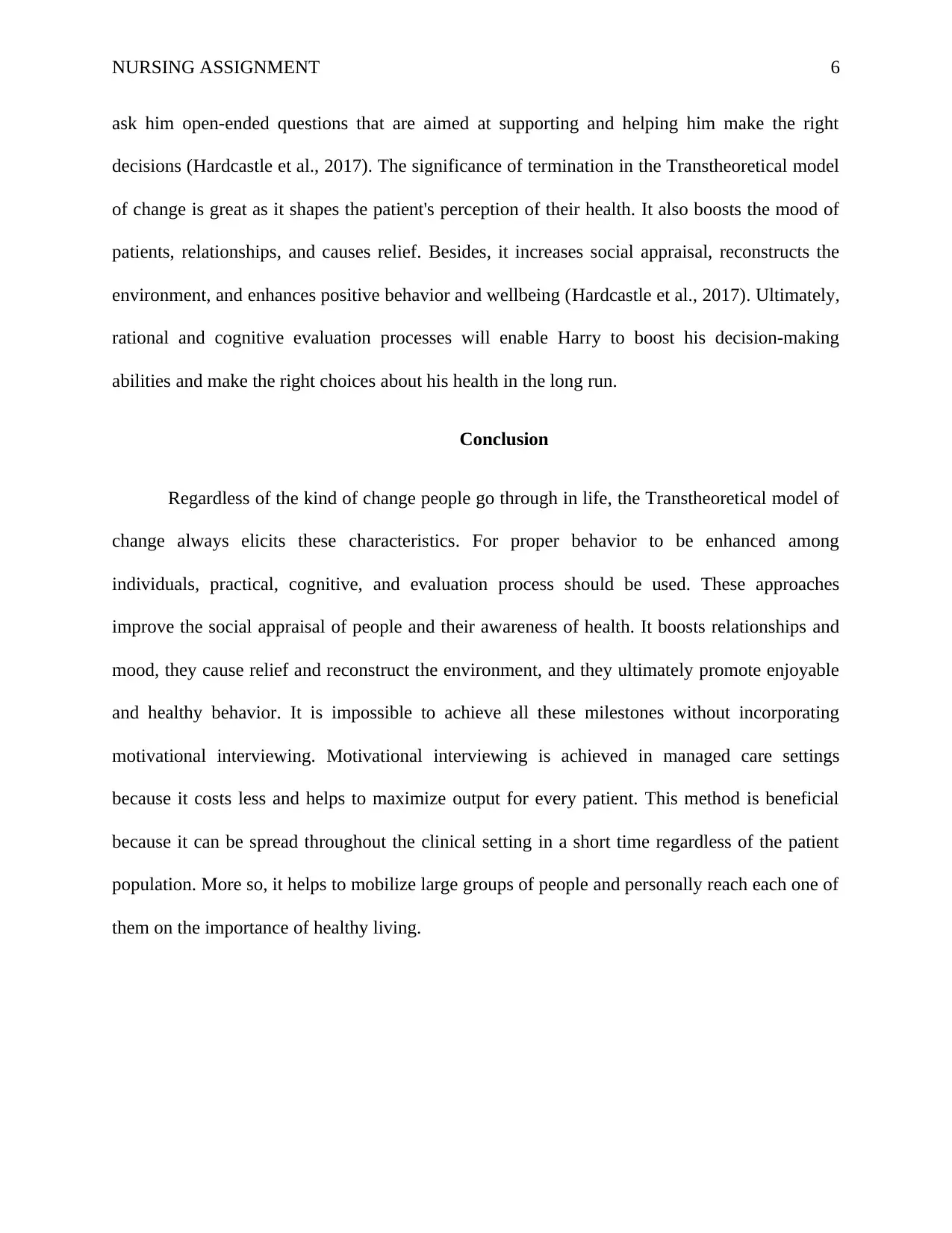
NURSING ASSIGNMENT 6
ask him open-ended questions that are aimed at supporting and helping him make the right
decisions (Hardcastle et al., 2017). The significance of termination in the Transtheoretical model
of change is great as it shapes the patient's perception of their health. It also boosts the mood of
patients, relationships, and causes relief. Besides, it increases social appraisal, reconstructs the
environment, and enhances positive behavior and wellbeing (Hardcastle et al., 2017). Ultimately,
rational and cognitive evaluation processes will enable Harry to boost his decision-making
abilities and make the right choices about his health in the long run.
Conclusion
Regardless of the kind of change people go through in life, the Transtheoretical model of
change always elicits these characteristics. For proper behavior to be enhanced among
individuals, practical, cognitive, and evaluation process should be used. These approaches
improve the social appraisal of people and their awareness of health. It boosts relationships and
mood, they cause relief and reconstruct the environment, and they ultimately promote enjoyable
and healthy behavior. It is impossible to achieve all these milestones without incorporating
motivational interviewing. Motivational interviewing is achieved in managed care settings
because it costs less and helps to maximize output for every patient. This method is beneficial
because it can be spread throughout the clinical setting in a short time regardless of the patient
population. More so, it helps to mobilize large groups of people and personally reach each one of
them on the importance of healthy living.
ask him open-ended questions that are aimed at supporting and helping him make the right
decisions (Hardcastle et al., 2017). The significance of termination in the Transtheoretical model
of change is great as it shapes the patient's perception of their health. It also boosts the mood of
patients, relationships, and causes relief. Besides, it increases social appraisal, reconstructs the
environment, and enhances positive behavior and wellbeing (Hardcastle et al., 2017). Ultimately,
rational and cognitive evaluation processes will enable Harry to boost his decision-making
abilities and make the right choices about his health in the long run.
Conclusion
Regardless of the kind of change people go through in life, the Transtheoretical model of
change always elicits these characteristics. For proper behavior to be enhanced among
individuals, practical, cognitive, and evaluation process should be used. These approaches
improve the social appraisal of people and their awareness of health. It boosts relationships and
mood, they cause relief and reconstruct the environment, and they ultimately promote enjoyable
and healthy behavior. It is impossible to achieve all these milestones without incorporating
motivational interviewing. Motivational interviewing is achieved in managed care settings
because it costs less and helps to maximize output for every patient. This method is beneficial
because it can be spread throughout the clinical setting in a short time regardless of the patient
population. More so, it helps to mobilize large groups of people and personally reach each one of
them on the importance of healthy living.
⊘ This is a preview!⊘
Do you want full access?
Subscribe today to unlock all pages.

Trusted by 1+ million students worldwide
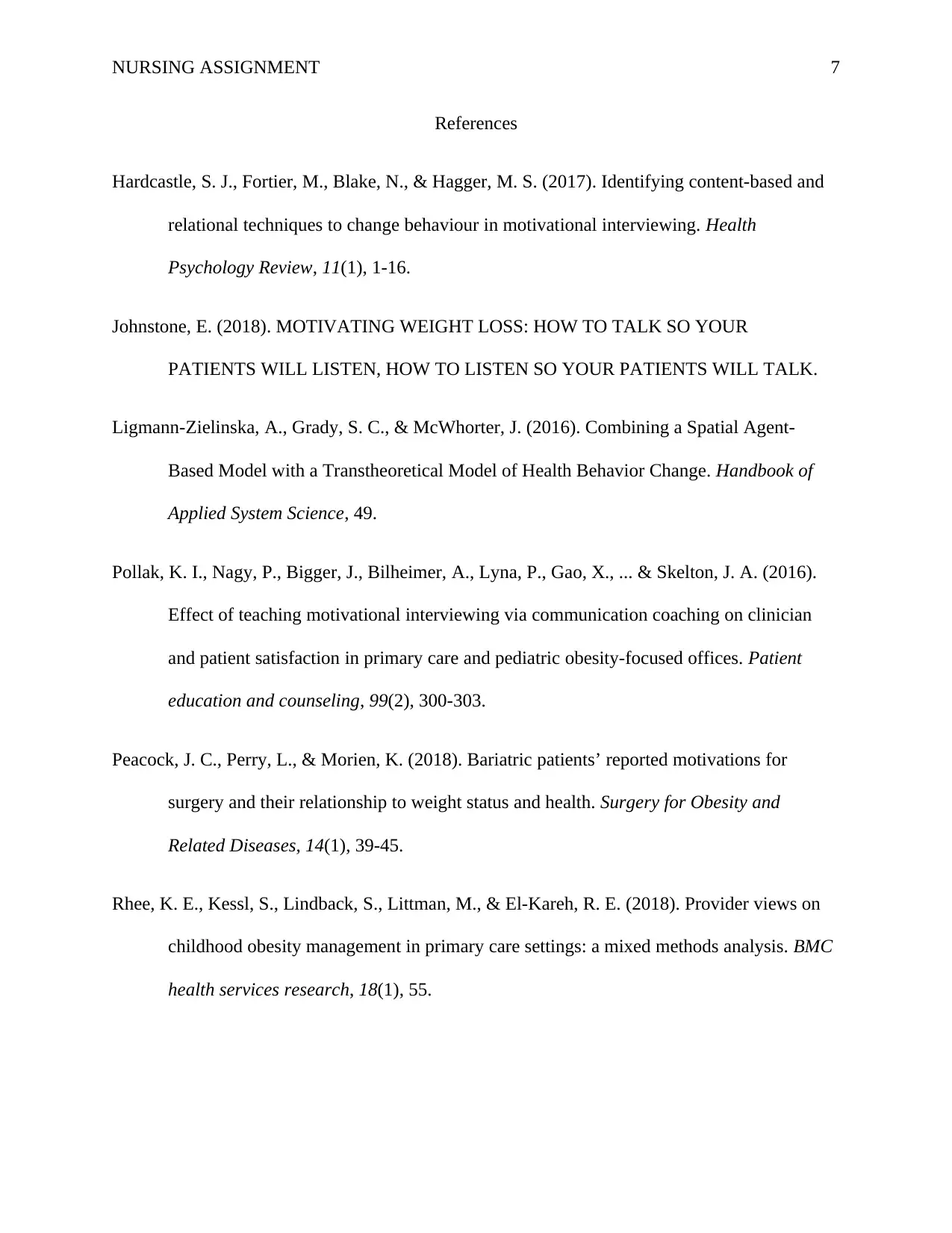
NURSING ASSIGNMENT 7
References
Hardcastle, S. J., Fortier, M., Blake, N., & Hagger, M. S. (2017). Identifying content-based and
relational techniques to change behaviour in motivational interviewing. Health
Psychology Review, 11(1), 1-16.
Johnstone, E. (2018). MOTIVATING WEIGHT LOSS: HOW TO TALK SO YOUR
PATIENTS WILL LISTEN, HOW TO LISTEN SO YOUR PATIENTS WILL TALK.
Ligmann-Zielinska, A., Grady, S. C., & McWhorter, J. (2016). Combining a Spatial Agent-
Based Model with a Transtheoretical Model of Health Behavior Change. Handbook of
Applied System Science, 49.
Pollak, K. I., Nagy, P., Bigger, J., Bilheimer, A., Lyna, P., Gao, X., ... & Skelton, J. A. (2016).
Effect of teaching motivational interviewing via communication coaching on clinician
and patient satisfaction in primary care and pediatric obesity-focused offices. Patient
education and counseling, 99(2), 300-303.
Peacock, J. C., Perry, L., & Morien, K. (2018). Bariatric patients’ reported motivations for
surgery and their relationship to weight status and health. Surgery for Obesity and
Related Diseases, 14(1), 39-45.
Rhee, K. E., Kessl, S., Lindback, S., Littman, M., & El-Kareh, R. E. (2018). Provider views on
childhood obesity management in primary care settings: a mixed methods analysis. BMC
health services research, 18(1), 55.
References
Hardcastle, S. J., Fortier, M., Blake, N., & Hagger, M. S. (2017). Identifying content-based and
relational techniques to change behaviour in motivational interviewing. Health
Psychology Review, 11(1), 1-16.
Johnstone, E. (2018). MOTIVATING WEIGHT LOSS: HOW TO TALK SO YOUR
PATIENTS WILL LISTEN, HOW TO LISTEN SO YOUR PATIENTS WILL TALK.
Ligmann-Zielinska, A., Grady, S. C., & McWhorter, J. (2016). Combining a Spatial Agent-
Based Model with a Transtheoretical Model of Health Behavior Change. Handbook of
Applied System Science, 49.
Pollak, K. I., Nagy, P., Bigger, J., Bilheimer, A., Lyna, P., Gao, X., ... & Skelton, J. A. (2016).
Effect of teaching motivational interviewing via communication coaching on clinician
and patient satisfaction in primary care and pediatric obesity-focused offices. Patient
education and counseling, 99(2), 300-303.
Peacock, J. C., Perry, L., & Morien, K. (2018). Bariatric patients’ reported motivations for
surgery and their relationship to weight status and health. Surgery for Obesity and
Related Diseases, 14(1), 39-45.
Rhee, K. E., Kessl, S., Lindback, S., Littman, M., & El-Kareh, R. E. (2018). Provider views on
childhood obesity management in primary care settings: a mixed methods analysis. BMC
health services research, 18(1), 55.
Paraphrase This Document
Need a fresh take? Get an instant paraphrase of this document with our AI Paraphraser
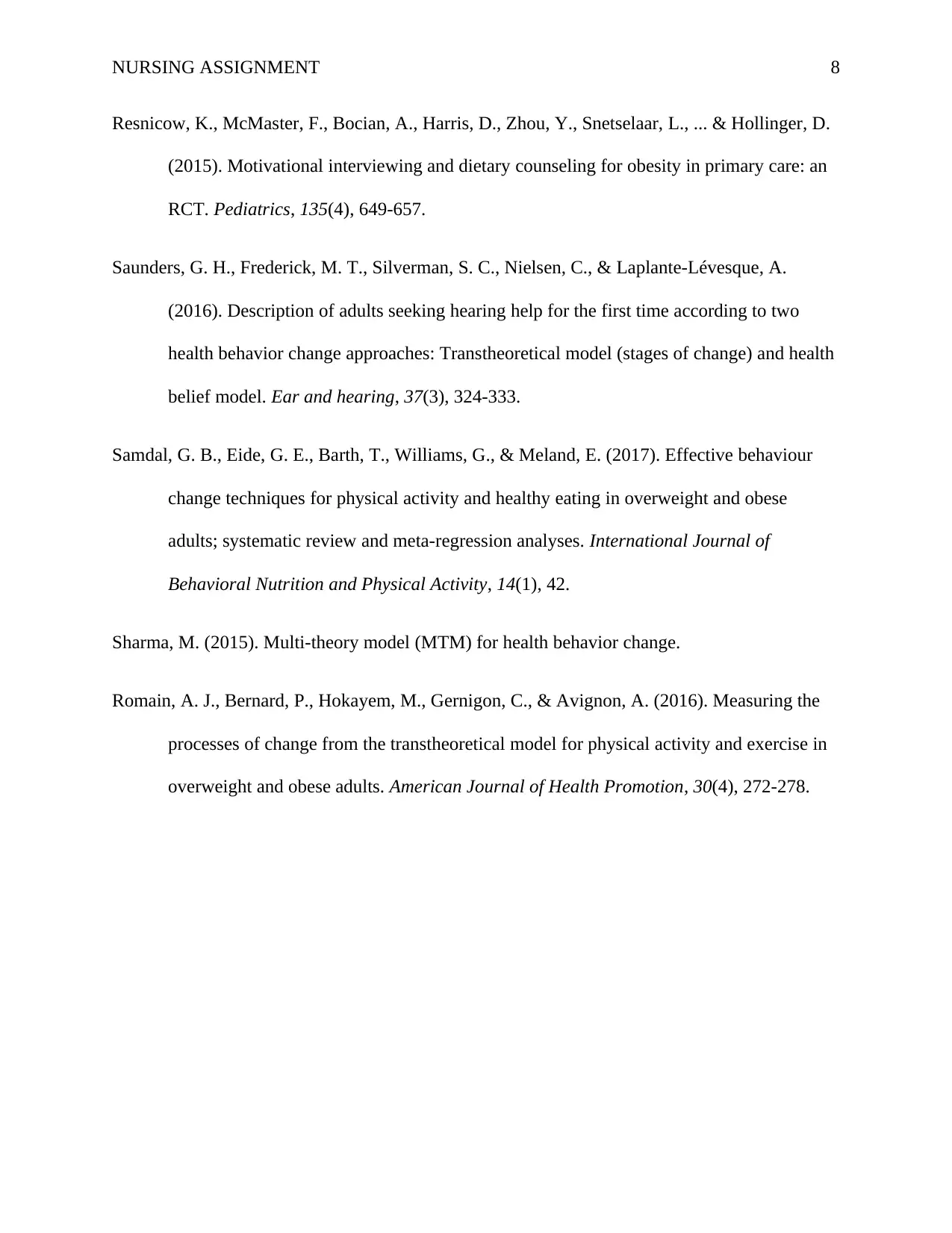
NURSING ASSIGNMENT 8
Resnicow, K., McMaster, F., Bocian, A., Harris, D., Zhou, Y., Snetselaar, L., ... & Hollinger, D.
(2015). Motivational interviewing and dietary counseling for obesity in primary care: an
RCT. Pediatrics, 135(4), 649-657.
Saunders, G. H., Frederick, M. T., Silverman, S. C., Nielsen, C., & Laplante-Lévesque, A.
(2016). Description of adults seeking hearing help for the first time according to two
health behavior change approaches: Transtheoretical model (stages of change) and health
belief model. Ear and hearing, 37(3), 324-333.
Samdal, G. B., Eide, G. E., Barth, T., Williams, G., & Meland, E. (2017). Effective behaviour
change techniques for physical activity and healthy eating in overweight and obese
adults; systematic review and meta-regression analyses. International Journal of
Behavioral Nutrition and Physical Activity, 14(1), 42.
Sharma, M. (2015). Multi-theory model (MTM) for health behavior change.
Romain, A. J., Bernard, P., Hokayem, M., Gernigon, C., & Avignon, A. (2016). Measuring the
processes of change from the transtheoretical model for physical activity and exercise in
overweight and obese adults. American Journal of Health Promotion, 30(4), 272-278.
Resnicow, K., McMaster, F., Bocian, A., Harris, D., Zhou, Y., Snetselaar, L., ... & Hollinger, D.
(2015). Motivational interviewing and dietary counseling for obesity in primary care: an
RCT. Pediatrics, 135(4), 649-657.
Saunders, G. H., Frederick, M. T., Silverman, S. C., Nielsen, C., & Laplante-Lévesque, A.
(2016). Description of adults seeking hearing help for the first time according to two
health behavior change approaches: Transtheoretical model (stages of change) and health
belief model. Ear and hearing, 37(3), 324-333.
Samdal, G. B., Eide, G. E., Barth, T., Williams, G., & Meland, E. (2017). Effective behaviour
change techniques for physical activity and healthy eating in overweight and obese
adults; systematic review and meta-regression analyses. International Journal of
Behavioral Nutrition and Physical Activity, 14(1), 42.
Sharma, M. (2015). Multi-theory model (MTM) for health behavior change.
Romain, A. J., Bernard, P., Hokayem, M., Gernigon, C., & Avignon, A. (2016). Measuring the
processes of change from the transtheoretical model for physical activity and exercise in
overweight and obese adults. American Journal of Health Promotion, 30(4), 272-278.
1 out of 8
Related Documents
Your All-in-One AI-Powered Toolkit for Academic Success.
+13062052269
info@desklib.com
Available 24*7 on WhatsApp / Email
![[object Object]](/_next/static/media/star-bottom.7253800d.svg)
Unlock your academic potential
Copyright © 2020–2026 A2Z Services. All Rights Reserved. Developed and managed by ZUCOL.





